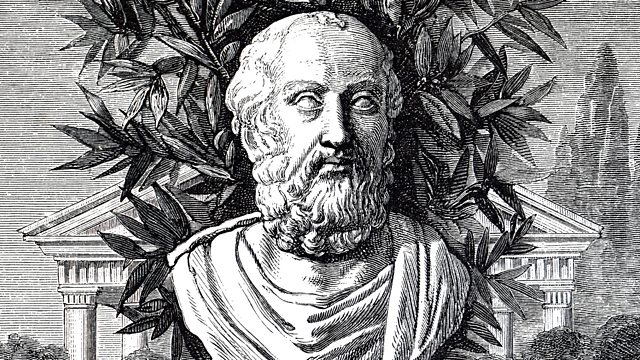Plato's Gorgias
Melvyn Bragg and guests discuss arguably the most personal of Plato's dialogues in which he examines the values that led to the execution of his mentor Socrates by drinking hemlock
Melvyn Bragg and guests discuss one of Plato's most striking dialogues, in which he addresses the real nature of power and freedom, and the relationship between pleasure and true self-interest. As he tests these ideas, Plato creates powerful speeches, notably from Callicles who claims that laws of nature trump man-made laws, that might is right, and that rules are made by weak people to constrain the strong in defiance of what is natural and proper. Gorgias is arguably the most personal of all of Plato's dialogues, with its hints of a simmering fury at the system in Athens that put his mentor Socrates to death, and where rhetoric held too much sway over people.
With
Angie Hobbs
Professor of the Public Understanding of Philosophy at the University of Sheffield
Frisbee Sheffield
University Lecturer in Classics and Fellow of Downing College, University of Cambridge
And
Fiona Leigh
Associate Professor in the Department of Philosophy at University College London
Producer: Simon Tillotson
Last on
More episodes
Previous
LINKS AND FURTHER READING
READING LIST
Peter Adamson, Classical Philosophy: History of Philosophy Without Any Gaps (Oxford University Press, 2014), especially chapter 17, ‘Virtue Meets its Match: Plato’s Gorgias’
Edward Craig (ed.), Routledge Encyclopaedia of Philosophy (Routledge, 1998)
J. Doyle, ’Socrates and Gorgias’ (Phronesis 55, 2010)
W. K. C. Guthrie, A History of Greek Philosophy vol. IV, Plato: The Man and his Dialogues Earlier Period (first published 1975; Cambridge University Press, 2008)
A. Hobbs, Plato and the Hero (Cambridge University Press, 2006)
Terence Irwin, Plato’s Ethics (Oxford University Press, 1995), especially chapters 7 and 8
C. Kahn, ‘Drama and Dialectic in Plato’s Gorgias’ (Oxford Studies in Ancient Philosophy 1, 1983)
Rachana Kamtekar, Plato’s Moral Psychology: Intellectualism, the Divided Soul, and the Desire for Good (Oxford University Press, 2017), especially chapter 3 ‘Why is Wrongdoing Unwilling’
Fiona Leigh, ‘Self-Knowledge, Elenchus, and Authority in Early Plato’ (Phronesis 65, 2020)
J. Ober, Political Dissent in Democratic Athens: Intellectual Critics of Popular Rule (Princeton University Press, 1998), especially Chapter 4
Plato (trans. T. Irwin), Gorgias (Oxford University Press, 1980)
Plato (ed. M. Schofield and trans.T. Griffith), Gorgias, Menexenus and Protagoras (Cambridge University Press, 2009)
Plato (introduction and commentary by E. R. Dodds), Gorgias (first published 1959; Oxford University Press, 1990)
Daniel Russell, Plato on Pleasure and the Good Life (Oxford University Press, 2005), especially chapter 2, ‘Pleasure, Virtue and Happiness in the Gorgias’
Robert Wardy, The Birth of Rhetoric: Gorgias, Plato and their Successors (Routledge, 1998)
R. Woolf, ’Callicles and Socrates: Psychic (dis)harmony in Plato’s Gorgias’ (Oxford Studies in Ancient Philosophy 18, 2000)
RELATED LINKS
Broadcasts
- Thu 25 Nov 2021 09:00�鶹������ҳ��� Radio 4
- Thu 25 Nov 2021 21:30�鶹������ҳ��� Radio 4
Featured in...
![]()
Ancient Greece—In Our Time
Browse the Ancient Greece era within the In Our Time archive.
![]()
Philosophy—In Our Time
From Altruism to Wittgenstein, philosophers, theories and key themes.
In Our Time podcasts
Download programmes from the huge In Our Time archive.
The In Our Time Listeners' Top 10
If you’re new to In Our Time, this is a good place to start.
Arts and Ideas podcast
Download the best of Radio 3's Free Thinking programme.
Podcast
-
![]()
In Our Time
Melvyn Bragg and guests discuss the ideas, people and events that have shaped our world.



